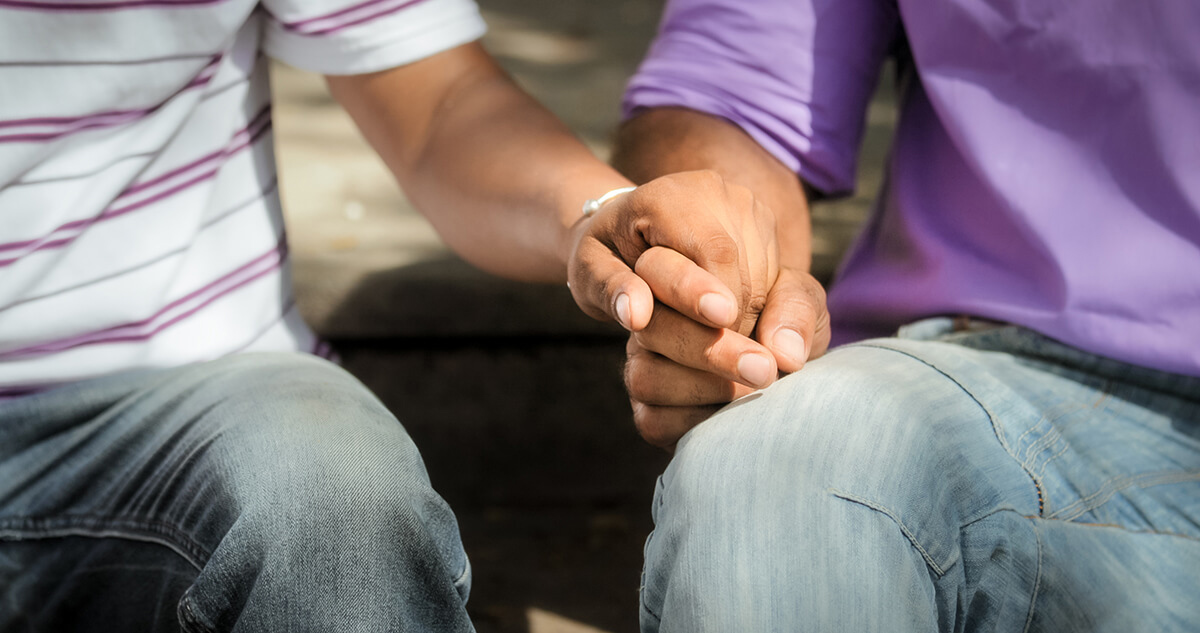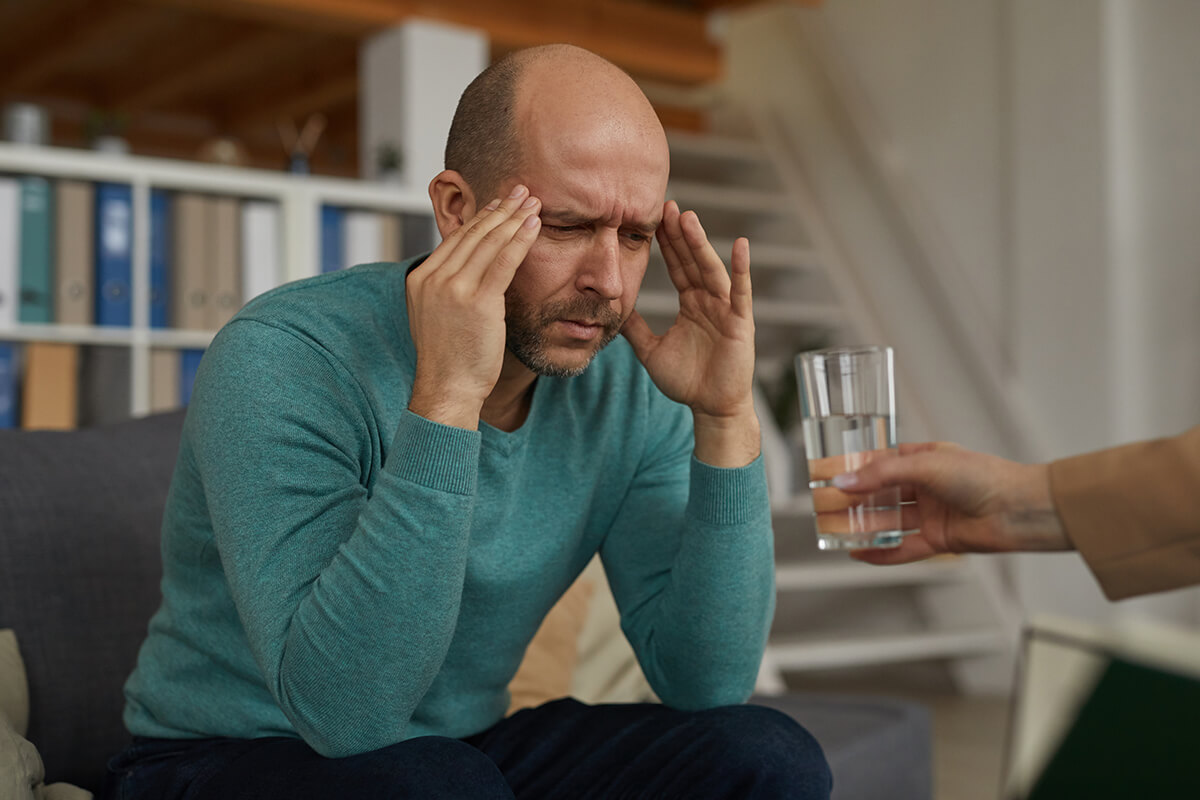 17 Mar 2021
17 Mar 2021
BY: admin
LGBTQ
Why Is Depression More Prevalent in the LGBTQ Community?
Why Is Depression More Prevalent in the LGBTQ Community?
Mental illness is more common in the LGBTQ communitites than any straight, cis-gender group. Approximately 4.5 precent of the United States population identify as gay, lesbian or bisexual, and over 39 percent have expeirneced a mental illness within the last year. In 2015, 60 percent of LGBTQ youth reported being so sad that they were no longer partaking in activities they once enjoyed. People who identify as transgender are also more likely to experience depression and attempt suicide. Why are people in the LGBTQ community experiencing depression at such a greater rate than the rest of the population?
There is no single answer, and we would never attempt to identify the true reason for an individual’s unique experience with mental health. However, there are some common experiences and themes in the lives of people who identify as LGBTQ that can lead to the development of depression. Understanding these causes can help you better understand and support a loved one or even help yourself.
Non-Supportive Family Members
LGBTQ youth who do not have family support are much more likely to experience depression, self-harm and attempt suicide; there is also a pandemic of youths being kicked out of their homes and thrust into homelessness because their parents or guardians do not accept them for who they are.
Even if someone can keep their housing, living under the same roof as people who are openly homophobic, transphobic, and/or abusive poses life-threatening risks to someone’s mental health. Depression and its accompanying feelings of hopelessness, shame, and worthlessness, can stem from a non-supportive environment.
Lack of Understanding and LGBTQ Resources
Despite the fact people are more open about mental health today, there is still limited knowledge surrounding the unique experiences, challenges, and emotions that influence an LGBTQ person’s mental health. Even doctors and therapists can be ignorant to the influences that cause their patients to experience depression. Failing to recognize the added challenges of being LGBTQ can worsen a person’s feelings of isolation.
Minority Stress
Although the community is millions strong, almost everyone who identifes as gay, lesbian, bisexual, trans, or queer has felt alone and outcasted at some point. LGBTQ people deal with constant stress and anxiety about their own safety, their future and their personal rights. It’s not something easy for a non-LGBTQ person to understand. It is exhausting trying to explain it, so most people stay quiet and suffer in silence.
People in the LGBTQ may also experience pressure as a minority to be an advocate for their group; however, taking on the role of educator is draining and can ultimately create more stress and pressure that negatively affects your mental health.
Colorado LGBTQ Counseling & Therapy
Our therapists offer care to LGBTQ teens and adults throughout Denver. We don’t believe that there is anything you need to change about yourself, only things you may need to overcome to live more authentically. Whether you feel trapped, alone or afraid, we are here to listen and help. Please contact us today to learn more and request an appointment at your earliest convenience.
 25 Feb 2021
25 Feb 2021
BY: admin
LGBTQ
The LGBTQ Community and Anxiety and Depression
The LGBTQ Community and Anxiety and Depression
Mental health is different for everyone, but there are particularly unique experiences in the LGBTQ community that position its members to experience greater levels of depression and anxiety. According to the Anxiety and Depression Association of America, LGBTQ depression and anxiety is 1.5 to 2.5 percent more prevalent than the same disorders among the heterosexual, gender-conforming population.
Many people who aren’t part of the LGBTQ community do not fully understand the experiences and circumstances that place individuals at a greater risk of mental illness. Stigma and fear of rejection also cause many “out members” to mask the depth of their feelings and mental health symptoms. In order to create a more inclusive society rooted in understanding, Caring Heart Counseling wishes to help communities, friends and family members understand the unique mental health experiences and needs of LGBTQ people.
Social Conditioning and Depression
From a very early age, children are exposed to both subvert and overt messages that allow them to build concepts of how a man or woman should be. They learn in movies, books and even through their own eye witnesses what love “should” look like. These mental concepts are called schema, and they form the framework of how a person goes on to interpret themselves and others.
Unfortunately, the narrative surrounding LGBTQ people has been grossly stereotyped. The gay man has always been ultra-feminine and sassy, a caricature that people come to expect from someone who comes out as gay. Transgender people are expected to “pass” fully and meet a certain set of physical criteria before others accept their identity, as if they are only okay with someone being trans if they look like a cisgender male or female.
A person who finds that their same-sex attraction or gender dysphoria do not align with their society’s expectations is more likely to experience feelings of inferiority, rejection and isolation that lead to clinical depression.
Living With Anxiety as an LGBTQ Person
The same messages that someone internalizes as a child can become their source of anxiety later in life. The fear that they are not good enough, that they’re “different” and flawed cause many LGBTQ people to develop general and social anxiety disorders. Rejection, discrimination and prejudices from communities can also lead to a threat response that causes LGBTQ people to fear everyday situations and interactions with other people.
A person who lives as LGBTQ might place extreme burdens on themselves to meet other people’s expectations. They may feel like they have to “prove” their good enough to be loved and accepted as if their sexuality or gender identity is a mark against them. Many people might listen to these concerns, but they aren’t often qualified or educated enough on the LGBTQ experience to provide the level of support someone needs to heal.
How Therapy Can Help
Therapy is one way to overcome depression, anxiety and other mental illnesses within the framework of being LGBTQ. At Caring Heart Counseling, we do not view your sexuality or gender identity as being a cause of any mental health symptoms. Your identity is not the problem, but it can be influencing your perception, impacting your relationships and negatively impacting how you see yourself.
An accepting, educated therapist can provide the compassionate support and understanding you need to benefit from therapy. If you would like to learn more, please contact us anytime or request an appointment.
 26 Oct 2020
26 Oct 2020
BY: admin
Relationships
How to Talk to Your Teen About Counseling
How to Talk to Your Teen About Counseling
You want nothing but the best for your teenager, and it’s heartbreaking to watch them struggle mentally. Your child may have voiced their mental health problems, or you may notice from afar that something is off but have no idea how to intervene. Many parents worry about bringing up counseling to their child for fear it will send the wrong message.
Unfortunately, some parents have used the therapy as a threat, implying that it is a punishment and their teenager’s mental health struggles are a wrongdoing. We want to change the view families have about counseling and help you present it as not only a form of treatment or a “last resort” for serious issues.
We believe counseling is a tool for everyone, and it can be just as beneficial for treating problems as it can be at preventing them. If you are wondering whether counseling is right for your teen, here are some of the topics a counselor can address:
- • Self-esteem and confidence
- • Social skills, including making new friends and dating
- • Family relationships
- • Depression, self-harm and suicide risks
- • Anxiety
- • Substance use and addiction
- • Eating disorders
- • Sexuality and gender identity
How to Bring Up Counseling to Your Teen
Your child should feel like they are included in the decision to go to therapy. Counselors will face a greater challenge forming a connection with your teen if they have been essentially forced into talking against their will. Resistance to participate in counseling often stems from fear, embarrassment or shame about their struggles. To combat this, you should start a dialogue that is rooted in love and a desire to help your teen feel good about themselves.
You should start off by reminding your teen that you love and care about them. Just because they may not always be receptive to affection does not mean they don’t need it. In fact, adolescents are particularly sensitive to approval, so affirmation is essential.
Let them know what you’ve noticed about their behavior or mental health, but avoid coming at it from a critical standpoint. For example, you may say, “You’ve seemed really down lately, and I’ve noticed you’re spending a lot more time alone than usual. I need alone time when I feel down, too. Has this been helpful for you?”
Once you begin to understand your teenager’s experience and perspective, you can suggest counseling as one way for them to help themselves. You may share about therapy being helpful to you as well; it can also be beneficial to mention that you understand talking to you or other people can be difficult, and a counselor will listen without judging or violating your teen’s confidentiality.
Reach Out Together
Inform your teen about their options when it comes to counseling. We offer virtual online therapy for teens that is accessible and convenient for their schedule. Being able to talk to a therapist online can also make talking to a professional less intimidating. Let your teen know their options, and explore different counselors and forms of therapy together. Then, make the appointment and encourage your teen to play an active role in their own wellness.
You can learn more about our teen counseling services and contact us anytime for more information. We’re also happy to provide you or your teen with personalized feedback about how we may help them address specific problems.
 20 Oct 2020
20 Oct 2020
BY: admin
Relationships
Political Stress and Anxiety and How to Cope
Political Stress and Anxiety and How to Cope
Social media and the internet has made it possible for political news, messages and online activism to reach us anywhere, anytime. Americans are stressed, anxious and downright scared about the direction the country is headed, and it’s natural to feel an unwavering sense of unease as things continue to progress beyond your control.
Some therapists have begun calling the uptick of politically-induced symptoms “election stress disorder.” While this is not a clinical diagnosis, it gives a name to the extremely common and increasing number of symptoms people are turning to therapy for help with. If you feel tense or anxious before checking the news, compelled to always see what is happening in the headlines and experience stress or depression thinking about the political climate in America, you may be suffering from this condition.
How Politics Cause Anxiety
Anxiety stems from fear of a threat, either real or perceived, which activates the autonomic nervous system. This is the system responsible for the fight-or-flight response. More than a psychological fear or constant worry, anxiety changes how your bodily systems function. It puts your brain on “high alert,” constantly tense and waiting for something bad to happen. In psychology, this is known as hyper-vigilance. It can impact our ability to function on a basic level.
When you constantly worry about politics, you may likely bring up worst-case scenarios or dwell on fears about what will happen if the opposing candidate wins. You may even feel like you’re stuck choosing between the lesser evil, essentially hoping for a miracle but fearful that there is no “right choice.”
No one can decide who you should vote for or what you should believe in but you. However, there is a social tie to politics these days that influences everything from our relationships to our feeling of control and autonomy. Even dating apps have even incorporated a feature that allows members to display whether or not they’ve voted on their profiles, causing us to immediately judge people for their outward actions and affiliations rather than getting to know them and their views independently.
While there’s nothing inherently wrong with being passionate about government, over-emphasizing politics can not only damage your mental health but also become a barrier in your relationships.
Ways to Cope With Political Stress
The most important thing to do is distance yourself from the source of your problem without becoming avoidant. Rather than prohibiting any type of political news, moderate how much you read, and be picky about what forms of media you engage with. Watching analysis and opinionated videos may only heighten your stress, and you’re likely to feel worse rather than better after reading comments and engaging in heated online debates.
Make note of how often you think about, engage with and talk of politics. Obsessive thoughts can lead to compulsive behaviors, actions we feel like we have to do to eliminate feelings of distress. This thought cycle also causes you to feel less in control, which only heightens your need to look for external sources of validation.
Take a moment to write down your priorities in life, and see how they align with or conflict with your current relationship with politics. You might find that your differing opinions with relatives and friends are causing you to be more judgmental and intolerant, pushing you away from people who you love and care for because you think differently about certain subjects.
It’s okay to hold your own stance on things, and not everything has to be a debate. Therapy can also help you learn to balance your own views while coping with others’ opinions. A counselor can also help you work through your own underlying thoughts, unease and fears about the future in a constructive way that empowers you in the present moment. Contact us for more information.
 24 Aug 2020
24 Aug 2020
BY: admin
Relationships / Virtual Counseling
Elementary School Anxiety and How to Set Yourself up for Success
Elementary School Anxiety and How to Set Yourself up for Success
Elementary school is one of the most exciting times of childhood; your child may be headed into Kindergarten, or they could be gearing up for another year filled with its own challenges, triumphs and memorable moments. Watching your child grow can be bittersweet, and with the coronavirus pandemic underway, sending your elementary school student back to school can be downright terrifying.
Anxiety is a normal and often healthy part of parenthood; it causes you to step back, pay closer attention and be proactive. But it can also hinder your ability to promote healthy independence and resilience in your child. To combat the anxiety and stress of another school year, here are some tips to keep in mind.
Put Safety First
Schools that are reopening for the new year will likely have safety measures in place. Your child may be required to wear a face mask during the day, which could be met with some discomfort or resistance. Talk about the importance of wearing a mask; tell your child they have an important role to play, and wearing a mask helps them protect themselves as well as their teachers and friends.
Practice wearing a mask in extended durations before school resumes, and teach your child how to properly wash their hands and apply hand sanitizer. To make the new safety measures a little less scary, get your child involved by letting them pick out a mask with a fun design.
Placing masks on their favorite stuffed animals can be a good way to introduce the concept and make it more approachable for a child.
Separation Anxiety
Parents and students can both experience anxiety when it’s time to go back to school. Combat this as early as possible by building excitement around the first day and upcoming year. Listen to your child’s worries, and offer reassurance. Rather than saying, “Don’t be worried,” tell them that it’s okay to be nervous, and everyone feels afraid of new things sometimes.
As a parent, your anxiety may be palpable to your child, which makes coping with it on your own time imperative. You don’t want to transfer any fears into your elementary schooler; therapy is one way to work through your fears, but speaking with your partner, journaling and talking with parents can help, too.
No Friends
Isolation is difficult for anyone, but children are impacted tenfold by their social engagement at school. Your child may have been placed in a new classroom this year and not be with any of their friends; you may have images of them eating alone, getting picked last for gym or recess and standing on the sidelines. This is a natural part of growing up that, although difficult, is important to your child’s growth.
Not having any friends in class might be scary at first, but it’s a chance for them to develop social skills and learn how to cope with discomfort. Read books about making new friends, roleplay with toys and assure your child they can still connect with their old friends online and outside of the classroom.
Coronavirus Closures
We are not sure how the virus will impact the new school year; it’s best to speak with your child now and let them know things may change throughout the year. Plan ahead by talking about closures, what they mean and how your child will have to learn if the school does need to shut down temporarily. Let them know that school closing doesn’t mean they can’t talk to their friends or teachers.
As a parent, the best thing you can do is try to find as much flexibility as possible. In addition to looking after your own mental health, it helps to come up with a plan for childcare and education in the event of another closure. You may never have to use it, but thinking about potential solutions now can help lower anxiety by reducing “what ifs.”
We offer both virtual and in-person counseling for parents and children that can make the transition back to school easier. Click here to get in touch with one of our therapists.

